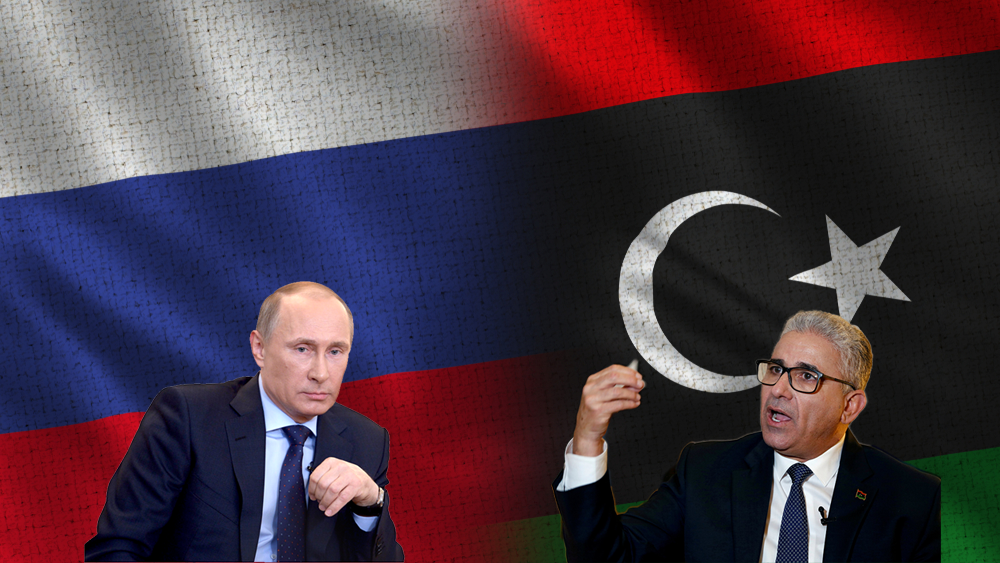Political parties in Libya have shown an interest in the developments of the Ukrainian crisis, as the Russian military intervention, which began on 24 February, happened in tandem with the formation of the government of Fathi Bashagha, which the government of Abdel Hamin Dbeibeh continues to resist handing power to. Despite Bashagha and Dbeibeh’s united positions in opposing the war and Libya’s vote in the Security Council condemning Russian intervention, Moscow has shown support for the creation of an alternative to the Government of National Unity. The war in Ukraine has highlighted Libya’s importance on the world’s energy map, as well as its dependency on wheat imports. The departure of the Russian Wagner group from Libya will also have implications on the balances of power between the various Libyan factions.
Several indications reveal the increasing impact of the war in Ukraine on the political dynamics in Libya:
- Support for the Bashagha Government: The Dbeibeh government opposed the outbreak of war in Ukraine based on its position towards Russia. Since assuming power, the Dbeibeh government attempted to build good relations with Russia, with a visit to Moscow (mid-April 2021). This was followed by the return of Russian companies to Libya in July of the same year, such as Tat Oil, that had suspended operations since 2011 in the Sirt and Ghadamis basins. However, Moscow’s support for the nomination of Saif al-Islam Gaddafi in the Libyan presidential election scheduled for last December, changed the course of this relationship. The Dbeibeh government believed that bridging the relationship gap through common interests would garner political support. However, a simple resumption of economic ties, and the reinstatement of suspended contracts in oil and gas or infrastructure was insufficient for the Russians who aspired to raise the level of economic partnership with Libya even further.
Differences between the two sides have spiraled since Moscow’s support for the formation of the Bashagha Government. This explains why the Libyan Ministry of Foreign Affairs has issued almost daily statements opposing Russian military intervention in Ukraine. In this context, it is surprising that Bashagha also declared his opposition to the war. Russia’s support to the new government can be attributed to the fact that the formation of the Bashagha Government and the parliamentary road map in general was contrary to Western aspirations. Indeed, the United Nations Mission is seeking alternative initiatives to establish a constitutional base and accelerate the electoral process. These endeavors were rejected by Parliament and buttressed by Russian support that undermines all the initiatives put forward by Stephanie Williams, largely attributed to American rather than UN influence. - Potential food crisis in Libya: Libya imports approximately 43 percent of its wheat (approx.. 650,000 tons) from Russia and Ukraine and therefore will be greatly affected by the war. This is especially so since Libya’s infrastructure has been significantly damaged by conflict over the last decade, undermining its ability to create a stock of food and grains. Accordingly, the price of bread in Libya has risen, as the current political crisis between the governments of Dbeibeh and Bashagha has prevented effective government stabilization of markets. It remains unclear how food security will be addressed, and what alternatives the government has in order to prevent a food crisis, especially if the struggle in political leadership continues. The Minister of Economy for the Dbeibeh government, Muhammed al-Huwayj, indicated that 12 other countries can export wheat to Libya instead of the Ukraine and Russia. However, the Dbeibeh government has not moved towards those alternatives, while the Bashagha government has not yet addressed the crisis, as it hasn’t officially taken office yet.
- The transfer of militia to Ukraine: Local Libyan and Syrian reports reveal that Moscow has returned some Syrian fighters from Libya to the Hamimim base in Syria, with a view to transferring them to Ukraine. Similarly, Libyan reports have indicated that the Russian Wagner group in Eastern Libya has moved to Al-Jafrah base, where it is speculated that Russia has prepared air transport should it need to evacuate these military groups for use in the Ukraine. Should that happen, the Libyan National Army would have to fill the vacuum left in their wake, as some of these fighters were spread over East-West lines of contact. This context may explain the recent interests by the Libyan army in conducting military exercises. On the other hand, the Joint Military Commission (5+5) indicated that Turkey has created confusion by failing to undertake a parallel military pullout as agreed at the Second Berlin Conference and the subsequent Paris Conference (June-November 2021).
- Growing interest in Libyan oil: Western countries have made sure that Libyan oil continues to be exported in order to meet energy demand, reduce dependence on Russian oil and gas, and curb the price spikes in the energy market. The Libyan Oil and Gas Minister Mohamed Oun however announced that Libya could not make up for the shortage in supply. The situation was complicated when the Tuareg group targeted the Sharara field, one of the most important oil-producing fields in Libya. Western embassies issued urgent statements calling for continued operation of the fields stressing the need to prevent the outbreak of a new armed conflict that might affect production in oil fields. And indeed, operations on the field resumed after the government of Dbeibah and Tuareg reached an understanding, helping the government to leverage the situation in its favor.
- Evacuating Libyan ex-pats from Ukraine: Evacuating Libyan nationals from the Ukraine is another situation in which the Dbeibeh government was happy to be actively involved. Foreign Minister Najla Mangoush visited Slovakia at the beginning of the war to personally oversee the evacuation process. This coincided with the formation of the new government, including the appointment of Hafiz Qadur as Minister for Foreign Affairs, who held the position of Ambassador of Libya to Europe until mid-August, but resigned in protest against the foreign policy of the government. This is indicative of a divergence in the foreign policy of the two governments, and also explains Mangoush’s prompt actions in evacuating Libyans from the war zone in Ukraine.
Finally, it can be said that the Russian war in Ukraine on Libya will increase Western interests in relying on Libya as an alternative source of energy, however, it is likely that international concern with the Ukrainian crisis will come at the expense of European and American interest in Libya. Various Libyan factions will shape their positions regarding this war according to dynamics of the political struggles Libya is now undergoing.


